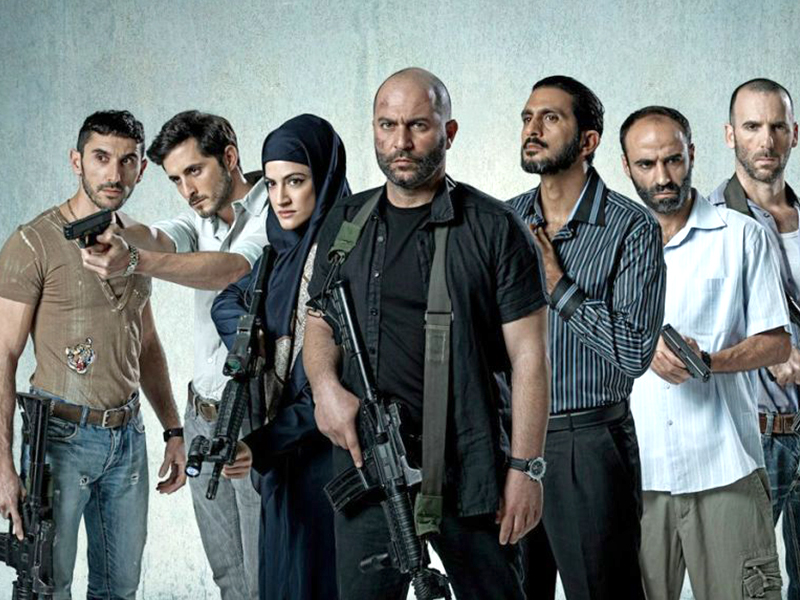I don’t want to watch, but I can’t look away. My viewing companion cowers behind a blanket, eyes unblinking. I intended to write about Fauda from the moment I felt its gut-wrenching grip, but after the most recent terrorist attack in Jerusalem, I do so urgently and with a heavy heart.
In the beginning, God created order from chaos. In a new, critically acclaimed drama that is currently streaming on Netflix, an Israeli-produced series boasts a cast of Israelis and Palestinians and sports an Arabic name: Fauda means chaos.
READ: MIDEAST CONFLICT IS THE ‘ELEPHANT IN THE ROOM’
The actors share dark, swarthy, Semitic looks. To further blur the lines, they speak each other’s languages and share human characteristics: love, passion, loyalty and belief in a cause. Gradually, the viewer clarifies the characters into Israeli and Palestinian camps, like a vision coming into focus after a blow to the head. Chaotic is certainly how I would describe my feelings after watching Fauda, experiencing the visceral heartbreak and misery inflicted on and endured by individuals on both sides of the conflict.
‘Both sides feel justified in bending the rules in the short term for a long-term solution’
It’s gripping, gritty and real. The women are beautiful but not in that filtered, enhanced Hollywood way. They are breathtaking in the way ponytailed female soldiers are when they stride unselfconsciously down a Tel Aviv boulevard. The men are not unshaven like runway models; they simply haven’t taken the time to shave. Even the baldest and most pot-bellied among them – our main character, Doron – is sexy. He’s the anti-leading man, oozing enough intensity to attract Palestinian doctor Shirin.
Testosterone rules the day but also gets in the way. Tension runs high. Everybody kicks and punches the office boxing bag to stay fit and sane – even feminine, sensitive Burit. Sometimes, the workout gets off the bag, like when Doron and his brother-in-law come to blows.
We are left with the unshakable glimpse of commonalities between enemies. Is it a fair representation? Both sides feel justified in bending the rules in the short term for a long-term solution, for example, torture in exchange for information. But the stakes keep rising along with the death toll in the vicious cycle of retaliation.
It’s not personal, and yet it couldn’t be more so. The Israeli operatives are after one man, one responsible for killing 116 Israelis. Before long, more than that number have been killed on both sides, and the emotional carnage produces a new suicide bomber and a reluctant accomplice. And so it goes.
I believe that Israel has history and morality on its side. But that doesn’t take away from the pain of individuals on both sides of the conflict, and the complexities and strength it will take to forgive and move on. I sought the perspective of an Israeli viewer.
READ: ISRAELI CENTRE TEACHES SOCIAL CHANGE TO JEWISH, PALESTINIAN YOUTH
Having grown up and completed his army service in Israel, Mordechai is bringing up his family in Toronto. He believes that although the losses on both sides are similar, the mentality is not.
“This TV series is an example of the democracy that Israel is and how freedom of speech reigns,” he says. “You can live in Israel or outside of Israel and freely criticize the government, the policies and the actions of the country. Palestinians are indoctrinated in the classroom to believe that they must destroy the homeland of the Jews. Israeli children learn no such thing at school. If they develop a fear or bias, it is by virtue of experiencing bombings and terrorist acts instigated by the Palestinians. Who started the 1973 war and how?”
He continued: “They attacked on Yom Kippur, our holiest day, and not just any time, but in the afternoon, when observers had been fasting since the evening before and were at their most vulnerable. Israel would never perpetrate an attack on Ramadan. And if they did, the UN and the world would be up in arms. Israel offers concessions. Israel does not initiate – it protects itself. Israel fights for freedom. Palestinians fight for chaos.”
The hallmark of a successful mediation is that both sides leave the table feeling they did not get a great deal. Sadly, there is no successful negotiation on the horizon in reality or on the show. But you have to give the show points for portraying both sides sympathetically.
The next season is slated to air in Israel at the end of 2017 and will reflect real news stories. Whatever one believes, watching Fauda suggests that the cycle of killing and revenge keeps peace beyond reach.
